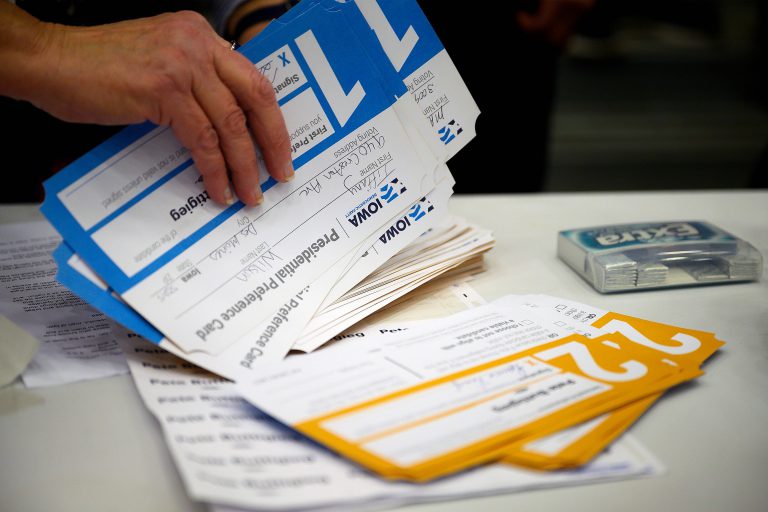Updated 2:43 a.m. ET Tuesday
The Iowa caucuses aren’t over yet. A delay in the results meant the state Democratic Party did not call the race Monday night as expected, leaving the candidates and their supporters in limbo.
In a brief statement he read to reporters over the phone shortly after 2 a.m. ET, Iowa Democratic Party Chair Troy Price said, “At this point the [Iowa Democratic Party] is manually verifying all precinct results. We expect to have numbers to report later today.”
“We are validating every piece of data we have against our paper trail,” Price said. “That system is taking longer than expected but it’s in place to ensure we are eventually able to report results with full confidence.”
Price said the party is continuing to update the campaigns. He took no questions.
The Iowa Democratic Party blamed “inconsistencies” found in a few results sets, noting it was not “a hack or intrusion.” But multiple county chairs on the ground blamed malfunctions, including on an app used to report results.
“We found inconsistencies in the reporting of three sets of results. In addition to the tech systems being used to tabulate results, we are also using photos of results and a paper trail to validate that all results match and ensure that we have confidence and accuracy in the numbers we report,” Iowa Democratic Party Communications Director Mandy McClure said in a statement.
“This is simply a reporting issue, the app did not go down and this is not a hack or an intrusion,” McClure continued. “The underlying data and paper trail is sound and will simply take time to further report the results.”
But despite the denials from the IDP that anything was wrong with the app, multiple county chairs on Monday night told NPR that there were, in fact, malfunctions that delayed reporting.
The Iowa Democratic Party and Democratic presidential campaigns held a phone call that sources say became heated at times. Party officials offered no time estimate on when results will be reported.
But as several candidates went ahead and addressed their restless supporters, there was a mounting frustration among the candidates, too.
Dana Remus, campaign general counsel to former Vice President Joe Biden, sent a letter to Price and IDP Executive Director Kevin Geiken demanding “full explanations and relevant information” after what the Biden campaign calls “failed” systems and “considerable flaws” by the IDP deployed for tonight’s caucuses.
“The app that was intended to relay Caucus results to the Party failed; the Party’s back-up telephonic reporting system likewise has failed. Now, we understand that Caucus Chairs are attempting to — and, in many cases, failing to — report results telephonically to the Party. These acute failures are occurring statewide,” Remus said.
NPR’s Miles Parks previously reported on concerns over the new use of a smartphone app for results reporting.

Despite the denials from the IDP that anything was wrong with the app, multiple county chairs on Monday night told NPR that there were, in fact, malfunctions that delayed reporting.
“The app didn’t work. Things didn’t work out right. I’ve been trying to call for several hours to report my results,” Des Moines County Democratic Party Co-Chairman Tom Courtney told NPR. “And I can’t get through the phone. It’s a phone number and I can’t get through. That number is constantly busy.”
Instead, Courtney said he’s now going home and will call and report his precinct’s results in the morning.
“[The Iowa Democratic Party] made it seem like this was going to work fine. They tested it, tested it,” Courtney said. “I’m old enough, I was skeptical, the whole thing, but I thought it would be better than it is. There’ve been problems. Little problems with it, right, all along. Guess I wasn’t surprised.”
Kurt Meyer, the chairman of the Tri-County Democrats (three rural counties in northern Iowa), echoed Courtney’s frustrations.
“There has been a lot of concerns from the get go about the security of the system. Why? Well, because we know that there are plenty of interests that would just as soon thwart the accurate reporting of results. So as a result, security has been a major issue,” Meyer said. “And yet the security of the system becomes an issue in part because you have all these volunteers in 1,700 different precincts, a lot of the volunteers are not going to be technologically sophisticated.”
9(MDM5MjE5NTg1MDE1Mjk1MTM5NjlkMzI1ZQ000))

